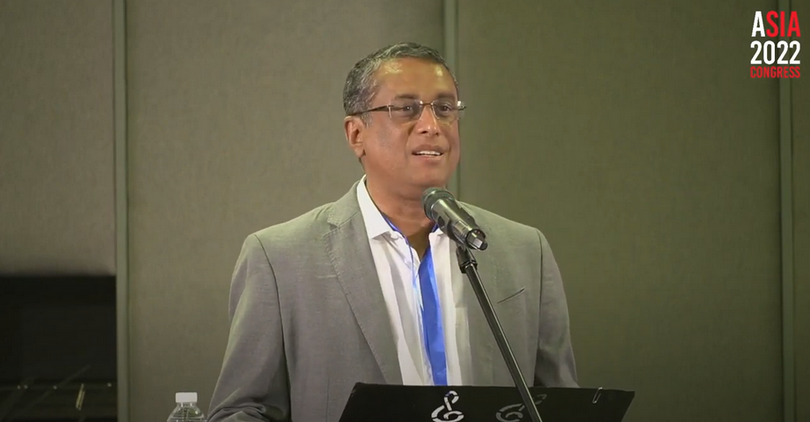An Indian Bible scholar has urged the Asian church not to follow the path of rationalism within the Western church, but instead seek to recover the supernatural power of the Holy Spirit.
From October 17 to 21, the Asia 2022 Congress gathered about 600 Christian leaders from across Asia in Bangkok, Thailand under the theme of "Rethinking Church and Mission: God’s Agenda for Today". It was convened jointly by the Lausanne Movement in Asia, the Asian Evangelical Alliance, and the Asian Theological Association.
On October 20, Finny Philip, the principal of Philadelphia Bible College in India, shared three points: "Why We Need to Restore Supernatural Power", "What We Need to Restore" and "How to Restore" in a Plenary Seven themed “Recovering the Supernatural”.
Dr. Philip pointed to the need and urgency of restoring supernatural power to the indigenous churches of Asia. Firstly, he found there is scholarly skepticism regarding claims about the seismic shift of the Holy Spirit movement. Many scholars doubt the authenticity of supernatural experiences claimed by the churches of the Southern Hemisphere. They question the growth of Christianity in that area because that growth merely reflects the general growth of the region's entire population. They warn believers to be wary of Southern Hemisphere Christian theology, some even claiming outright that its power is not from Christ.
Secondly, he pointed out that reductionism and western syncretism continue to govern our mindset, dominating how we read and understand the Bible and how we are to live as Christians.
Thirdly, the concept of one Jerusalem versus multiple “Jerusalems” continues to exert influence. He pointed out that the indigenous Asian church's Holy Spirit movement emerged years before that in Europe and North America, but it has always faced challenges from the "one-center" view. The classical Pentecostalism of the first wave, the Charismatic movement of the second wave and the Neo-Charismatics of the third wave have permeated the theology of the indigenous churches in Asia. They continue to influence how believers worship, practice their faith, and spread the Gospel.
Dr. Philip then shared that facing these forces of Western nationalism, the Asian church should restore three aspects of the supernatural: The first is to restore a broader comprehension of prayer and spiritual warfare. Dr. Philip found that the third wave of Neo-Charismatics brought reductionism into the church, reducing all to a narrow understanding of prayer and spiritual warfare. He urged the Asian church to recognize that spiritual warfare is multi-dimensional. Prayer brings not only healing but also personal and regional transformation.
The second is to restore the spiritual gifts of healing, prophecy, dreams, and vision. The scientific worldview since the Western Enlightenment has left little room for the supernatural. People have pluralized the interpretation of supernatural facts and spiritual experience has been restricted to specific places and time such as in church on Sunday. He used a local church example to emphasize that the church should break these limitations when availing itself of its spiritual gifts.
Third, citing Craig Keener's book, Dr. Phillip stated that the church needs to lead believers back to spiritual hermeneutics, which is experiential, missional, and eschatological. He quoted Dr. Keener: "The phenomena observed in the book of Acts is similar to what is being seen throughout the world in the global Charismatic movement. What is seen in these cross-cultural experiences as well as the New Testament is the contextualization of faith and the challenging of modern notions that have dismissed the demonic and the miraculous.”
He encouraged the local church “to use the hermeneutics of trust against the hermeneutics of suspicion when approaching the Bible”. Sensing the spiritual truths witnessed in the biblical narrative can be transferred to the spiritual experiences of people today.”
Dr. Philip shared that to restore the supernatural, the Asian church today should first rethink the church of the New Testament era and let the church become a habitus nurturing the supernatural.
The places that served as churches during the Apostolic period mostly were an atrium-house, a non-elite domestic space above a shop, a carpenter’s shop, commercial and dwelling places, etc. He said: "I'm not talking about house churches. I'm talking about the home as a place to practice theology. If that becomes a space nurturing the supernatural, it has the opportunity to both mentor as well as to allow spiritual gifts to move within the church.”
Dr. Philip also suggested that the church should build up an ecosystem of leadership that nurtures the supernatural. He said Ephesians 4:1-16 shows us that Jesus bridged the natural and supernatural and gave an ecosystem that encompasses the fivefold ministry of apostles, prophets, evangelists, shepherds and teachers.
He added: “I'm not talking about hierarchy, I'm not talking about titles, I'm not talking about positions. I'm talking about an ecosystem in which five or any other multiple work together for the building up of the church.” “Let’s be natural in our own being and expect the supernatural in the church.”
In closing, Dr. Philip encouraged all participants to seek for the supernatural to become alive throughout the Asian church.











